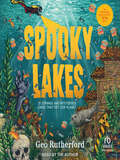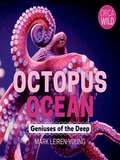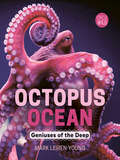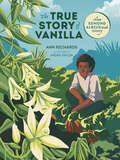Title search results
Showing 1 - 4 of 4 items

Spooky lakes: 25 strange and mysterious lakes that dot our planet
By Geo Rutherford. 2024
DAISY audio (Direct to player), DAISY audio (Zip)
Nature, Canadian authors (Non-fiction)
Human-narrated audio
Dive into the most mysterious waters around the world (if you dare) in Spooky Lakes , a must-listen nonfiction book…
from TikTok star and educator Geo Rutherford Some of Earth's strangest-and creepiest-wonders lie deep below the surface. There's Lake Natron, a Tanzanian lake so briny that its waters can mummify any creature that touches its surface; Lake Maracaibo, a Venezuelan tidal bay where a constantly brewing storm sends an average of twenty-eight lightning bolts per second into the water; and at the bottom of Lake Superior, the crew of the USS Kamloops -which mysteriously disappeared in 1921-remains somehow almost perfectly preserved to this day. From Geo Rutherford-the creator of the hit series Spooky Lake Month (over sixty-five million likes!)-comes this thrilling nonfiction book that plumbs the depths of twenty-five unusual lakes around the world. Listeners will learn not only about the science of hydrology, but why understanding the natural world is crucial to protecting it from pollution and climate change. Backed by extensive research and packed with all-new content, Spooky Lakes takes listeners on an adventure through weird and wild waters
Octopus ocean: Geniuses of the deep (Orca Wild #15)
By Mark Leiren-Young. 2025
DAISY audio (Direct to player), DAISY audio (Zip)
Environment, Animals and wildlife, Nature, Canadian authors (Non-fiction)
Human-narrated audio
With their blue blood, big brains and eight arms, octopuses are dramatically different from any other being. Octopuses are masters…
of camouflage and known for their incredible escapes from tight spots. New research shows that they are highly intelligent creatures, and while they prefer to be alone, they will interact with humans and display unique personality traits. In Octopus Ocean, discover the mysteries and histories of octopuses big and small-their biology, habitat and habits-and explore the top threats to their future, including warming oceans, over-fishing and pollution. Part of the nonfiction Orca Wild series for middle-grade readers this book introduces kids to octopuses all over the world. It discusses octopus habitat, biology and threats to survival, and how scientists, conservationists and young people are working to protect octopuses everywhere
Octopus ocean: Geniuses of the deep (Orca Wild #16)
By Mark Leiren-Young. 2025
Braille (Contracted), Electronic braille (Contracted), DAISY Audio (Direct to Player), DAISY Audio (Zip), DAISY text (Direct to player), DAISY text (Zip), Word (Zip), ePub (Zip)
Nature, Animals and wildlife, Environment, Canadian authors (Non-fiction), Social issues
Synthetic audio, Automated braille
With their blue blood, big brains and eight arms, octopuses are dramatically different from any other being. Octopuses are masters…
of camouflage and known for their incredible escapes from tight spots. New research shows that they are highly intelligent creatures, and while they prefer to be alone, they will interact with humans and display unique personality traits. In Octopus Ocean, discover the mysteries and histories of octopuses big and small—their biology, habitat and habits—and explore the top threats to their future, including warming oceans, over-fishing and pollution
The true story of vanilla: How edmond albius made history (Orca Biography #3)
By Ann Richards. 2025
Braille (Contracted), Electronic braille (Contracted), DAISY Audio (Direct to Player), DAISY Audio (Zip), DAISY text (Direct to player), DAISY text (Zip), Word (Zip), ePub (Zip)
Science and medicine biography, Nature, Biography, Social issues, Canadian authors (Non-fiction)
Synthetic audio, Automated braille
In 1841, a 12-year-old enslaved boy, Edmond Albius, made history when he discovered how to hand-pollinate vanilla plants using a…
bamboo twig. Until that time, only bees in Mexico could pollinate the plant—botanists couldn't figure out another way. With his master, Edmond travelled around Réunion Island to share his technique, le geste d'Edmonde (Edmond's gesture), which is still in use today. Despite his important achievement, as an enslaved person Edmond didn't receive payment or recognition for his contribution to science, eventually dying in poverty after being freed from slavery in 1848. Today it is recognized that Edmond's method of pollination was key to bringing vanilla to the world, helped to create a billion-dollar industry and gave us the flavor we love to use in cooking, baking, medicine and, of course, ice cream